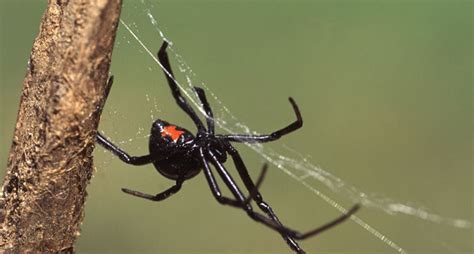In most cases, spiders are not dangerous pests. In fact, they’re helpful predators that can control populations of flies, mosquitoes, and other insects you might find more bothersome. However, there are a few ways spiders can be considered a nuisance or even a danger:
Fear and Anxiety: For some people, even the sight of a spider can trigger arachnophobia, a fear of spiders. This fear can cause anxiety and distress, making it difficult for people with arachnophobia to relax in their own homes.
Venomous Bites: While most spiders found in homes are not venomous, a few species can deliver bites that are painful and require medical attention. These include:
- Black Widow: Recognized by its shiny black body with a red hourglass marking on the underside of the abdomen. Their bites can cause muscle cramps, nausea, and sweating.
- Brown Recluse Spider: This spider has a violin-shaped marking on its back. Their bites can cause initial redness that develops into a serious wound if left untreated.
Allergic Reactions: In rare cases, people can have allergic reactions to spider bites. Symptoms can include swelling, redness, itching, and difficulty breathing. If you experience any severe symptoms after a spider bite, seek medical attention immediately.
Messy Webs: While some people find spiderwebs fascinating, others find them unsightly and inconvenient. Webs can build up in doorways, windows, and corners, creating a cluttered and unpleasant appearance.
Here are some things to keep in mind:
- The benefits of spiders as pest control often outweigh the dangers.
- If you have a spider problem and none of the spiders are venomous, the best course of action is usually to remove them humanely (by catching and releasing them outdoors) or discourage them from staying with preventative measures.
- If you suspect you’ve been bitten by a venomous spider, seek medical attention immediately.
Overall, while spiders can be a nuisance and a scary sight for some, they are rarely a true danger in most homes. Understanding the different types of spiders and taking preventative measures can help you coexist peacefully with these eight-legged house guests.
There are two main approaches to spider control: prevention and elimination. Here’s a breakdown of methods for each:
Prevention:
- Seal up entry points: Caulk cracks and gaps around windows, doors, foundations, and utility lines. Install screens on windows and doors, and repair any holes or tears. This will help prevent spiders from entering your home in the first place.
- Declutter your home: Spiders like to hide in clutter. Regularly remove cobwebs and keep boxes, furniture, and other items away from walls to reduce potential hiding spots.
- Store food properly: Don’t leave food crumbs or spills out in the open. Store food in sealed containers and clean up any messes immediately. This will help reduce the number of insects spiders prey on, making your home less attractive to them.
- Vacuum regularly: Vacuuming regularly, especially along baseboards and corners, can help remove spiders and their webs. Pay attention to areas where you’ve seen spider activity in the past.
Elimination:
- Natural repellents: Certain scents are said to repel spiders. You can try spraying a vinegar solution (equal parts white vinegar and water) around entry points or suspected spider habitats. Peppermint oil, tea tree oil, and lavender oil are also sometimes used as spider repellents. However, the effectiveness of these methods can vary.
- Traps: Sticky traps placed in corners and along baseboards can capture spiders. This can be an effective way to eliminate individual spiders, but may not be a long-term solution for heavy infestations.
- Insecticides: There are a number of insecticides available that can be used to kill spiders. However, these should be used with caution, as they can also harm other insects and pets. Be sure to follow the instructions on the label carefully and only use insecticides in targeted areas.
Additional Considerations:
- Professional help: If you have a severe spider infestation, or if you’re uncomfortable dealing with spiders yourself, it’s best to call a professional pest control company. They have the experience and expertise to safely and effectively eliminate spiders from your home.
- Harmless spiders: Many common house spiders are beneficial predators that help control populations of other insects. If you see a spider in your home, it may be best to leave it alone, especially if it’s not in a high-traffic area.
Remember, prevention is key when it comes to spider control. By taking steps to make your home less hospitable to spiders, you can keep them from becoming a problem in the first place.

